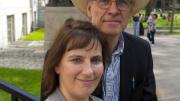Harvard College dean Evelynn M. Hammonds announced today that professor of the history of science Anne Harrington ’82 and her husband, John Durant, will serve as the new master and co-master of Pforzheimer House. Having spent their careers focused on teaching and learning, Harrington and Durant—who succeed current masters Nicholas and Erika Christakis—will begin their duties this fall, living in the house along with their eight-year-old son, Jamie.
“I am very excited,” Harrington said in a University press release. “We spoke to a lot of masters as a part of this process, and through those discussions we got a sense of the real joy that this kind of position can bring and also what a wonderful opportunity for service this can be.”
Durant—director of the MIT Museum and an adjunct professor in MIT’s Science, Technology & Society Program—agreed, also saying that it would be an excellent place to raise their son.“I see this as enormously enriching for the family,” he said, adding, “to be surrounded by smart, energized, talented young people—why would that not just be the greatest opportunity for a young child?”
Harrington, a professor of the history of science and director of undergraduate studies for the department, received her A.B. summa cum laude from Harvard and her Ph.D. in the history of science from Oxford. Specializing in the history of psychiatry, neuroscience, and the other mind and behavioral sciences, she returned to teach at Harvard in 1988, and for six years co-directed the Mind, Brain, and Behavior Initiative. (She has also been a consultant for the MacArthur Foundation Research Network on Mind-Body Interactions.) In 2004, she was appointed to a five-year term as a Harvard College Professor, in recognition of her teaching skills; she has also won the Phi Beta Kappa Alpha Iota Prize for excellence in teaching. The author of three books, she currently serves as co-editor of Biosocieties—a journal concerned with social-science approaches to the life sciences.
Durant earned a B.A. in natural sciences and a Ph.D. in the history and philosophy of science from Queens’ College, Cambridge. He focuses on introducing science to a broader spectrum of people through events like the Cambridge Science Festival—a celebration showcasing the leading edge in science, technology, engineering, and math. For the past five years, he and Harrington have also taught in Harvard study-abroad programs in England; they are planning this summer for an eight-week program, “Science, Medicine, and Religion in an Age of Skepticism,” that includes classroom study, extensive travel, and independent projects.
Harrington and Durant expressed excitement about their new roles, saying there is much to be learned from living in a vibrant and talented community. “How can we leverage that into something greater than the sum of its parts?” Harrington asked. “This is an opportunity and a challenge we take very seriously and one we are very much looking forward to.”








